handbook-executive-leadership-of-research-development-pdf-v10
handbook-executive-leadership-of-research-development-pdf-v10
handbook-executive-leadership-of-research-development-pdf-v10
Create successful ePaper yourself
Turn your PDF publications into a flip-book with our unique Google optimized e-Paper software.
Introduce measures to reward and retain talented <strong>research</strong>ersInvesting in measures to reward and retain high performing <strong>research</strong>ers is asimportant as recruiting them in the first instance. It confirms beyond doubt thatuniversity takes <strong>research</strong> seriously. As we observed in the introduction to this<strong>handbook</strong>, <strong>leadership</strong> for <strong>research</strong> requires specialist skills and knowledge about theorganisational conditions that contribute to academic productivity. Promotion systemsare an obvious point <strong>of</strong> focus for <strong>executive</strong> leaders early in the implementation <strong>of</strong> thechange agenda. They should be reviewed and reframed with input from <strong>research</strong>leaders to reinforce the value the university places on the work <strong>of</strong> highly productive<strong>research</strong>ers.Financial rewards are important but not sufficient to attract, motivate and retaintalented <strong>research</strong> academics. Amongst other things, they can be rewarded simplyby being part <strong>of</strong> a significant new venture and raising the international pr<strong>of</strong>ile andstanding <strong>of</strong> the university. The structure and processes <strong>of</strong> rewards and recognitionshould send a strong and singular message to these people: ‘if you are good at whatyou do we have ways <strong>of</strong> helping you stay and succeed in your <strong>research</strong> endeavoursto a world class level’.Executive leaders <strong>of</strong> <strong>research</strong> should therefore ensure that the systems <strong>of</strong> reward forhighly productive, and the work conditions provided, respect and tap into the corework motives and values <strong>of</strong> high-performing academics — especially the opportunityto engage in <strong>research</strong> work <strong>of</strong> deep personal interest. This requires resources,direct incentives and opportunities to collaborate with colleagues nationally andinternationally. Talented <strong>research</strong>ers are intensely focused on being at the leadingedge in their field and welcome less obvious indirect rewards include supportingpartnerships that help them find new avenues for <strong>research</strong>, stimulate their personalinterest and advance their careers. Finally, systems aside, personal acknowledgement<strong>of</strong> their work from the <strong>executive</strong> leader can be a very powerful motivator even for themost experienced and talented. Academics are rewarded when <strong>research</strong> leaders theyrespect take the trouble to get to know them and their work.70 A <strong>handbook</strong> for <strong>executive</strong> <strong>leadership</strong> <strong>of</strong> <strong>research</strong> <strong>development</strong>



